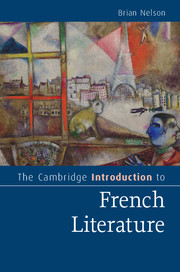Book contents
- Frontmatter
- Dedication
- Contents
- Preface
- Acknowledgements
- Chronology
- 1 Villon: a dying man
- 2 Rabelais: the uses of laughter
- 3 Montaigne: self-portrait
- 4 Corneille: heroes and kings
- 5 Racine: in the labyrinth
- 6 Molière: new forms of comedy
- 7 La Fontaine: the power of fables/fables of power
- 8 Madame de Lafayette: the birth of the modern novel
- 9 Voltaire: the case for tolerance
- 10 Rousseau: man of feeling
- 11 Diderot: the enlightened sceptic
- 12 Laclos: dangerous liaisons
- 13 Stendhal: the pursuit of happiness
- 14 Balzac: ‘All is true’
- 15 Hugo: the divine stenographer
- 16 Baudelaire: the streets of Paris
- 17 Flaubert: the narrator vanishes
- 18 Zola: the poetry of the real
- 19 Huysmans: against nature
- 20 Mallarmé: the magic of words
- 21 Rimbaud: somebody else
- 22 Proust: the self, time and art
- 23 Jarry: the art of provocation
- 24 Apollinaire: impresario of the new
- 25 Breton … Company: Surrealism
- 26 Céline: night journey
- 27 Sartre: writing in the world
- 28 Camus: a moral voice
- 29 Beckett: filling the silence
- 30 French literature into the twenty-first century
- Notes
- Further reading
- Index of authors and titles
- Index of genres, movements and concepts
- Cambridge Introductions to …
- References
28 - Camus: a moral voice
Published online by Cambridge University Press: 05 July 2015
- Frontmatter
- Dedication
- Contents
- Preface
- Acknowledgements
- Chronology
- 1 Villon: a dying man
- 2 Rabelais: the uses of laughter
- 3 Montaigne: self-portrait
- 4 Corneille: heroes and kings
- 5 Racine: in the labyrinth
- 6 Molière: new forms of comedy
- 7 La Fontaine: the power of fables/fables of power
- 8 Madame de Lafayette: the birth of the modern novel
- 9 Voltaire: the case for tolerance
- 10 Rousseau: man of feeling
- 11 Diderot: the enlightened sceptic
- 12 Laclos: dangerous liaisons
- 13 Stendhal: the pursuit of happiness
- 14 Balzac: ‘All is true’
- 15 Hugo: the divine stenographer
- 16 Baudelaire: the streets of Paris
- 17 Flaubert: the narrator vanishes
- 18 Zola: the poetry of the real
- 19 Huysmans: against nature
- 20 Mallarmé: the magic of words
- 21 Rimbaud: somebody else
- 22 Proust: the self, time and art
- 23 Jarry: the art of provocation
- 24 Apollinaire: impresario of the new
- 25 Breton … Company: Surrealism
- 26 Céline: night journey
- 27 Sartre: writing in the world
- 28 Camus: a moral voice
- 29 Beckett: filling the silence
- 30 French literature into the twenty-first century
- Notes
- Further reading
- Index of authors and titles
- Index of genres, movements and concepts
- Cambridge Introductions to …
- References
Summary
Don't wait for The Last Judgment. It takes place every day.
– Camus, The FallWhen Albert Camus (1913–60) was awarded the Nobel Prize in Literature in 1957, the jury singled out for special mention the contribution he had made to illuminating ‘the problems of the human conscience in our times’. Camus and Sartre were united by their common need to explore the limits and consequences of human action in an age – the war and the immediate post-war period – in which fundamental values needed to be rediscovered and reaffirmed. On the other hand, they were separated by their totally different social backgrounds and by their profoundly different attitudes to politics. Whereas Sartre, the Parisian, was a son of the bourgeoisie, received a highly privileged education and came first in the national philosophy examination (the agrégation), Camus was the son of European (French and Spanish) immigrants to Algeria, the French colony where he grew up in conditions of extreme poverty; and he was forced by tuberculosis to cut short his education at the University of Algiers. Whereas Sartre was a builder of grand intellectual systems, Camus was suspicious of doctrinaire thinking of any kind and distrusted abstractions that cannot be verified by personal experience.
The outsider
Camus's first publications were two slim volumes of lyrical essays, Betwixt and Between (L'Envers et l'endroit, 1937) and Nuptials (Noces, 1938). Together with his later collection of essays, L'Eté (Summer, 1954), they contain some of his best writing. Their setting is Algeria and their central theme is the contrast between the pleasures of the natural world – the sea, sun and light of the Mediterranean – and the dark realities of poverty and death. This contrast is an aspect of what, in his essay The Myth of Sisyphus (Le Mythe de Sisyphe, 1942), Camus called ‘the absurd’. For Camus this meant any of three things: a sense of human mortality (greatly heightened in the case of Camus by the shadow cast by his tubercular condition); the presence in the world of apparently arbitrary suffering and death; and the disjunction between the lack of immanent meaning in the world and the human need for sense and purpose.
- Type
- Chapter
- Information
- The Cambridge Introduction to French Literature , pp. 208 - 215Publisher: Cambridge University PressPrint publication year: 2015

